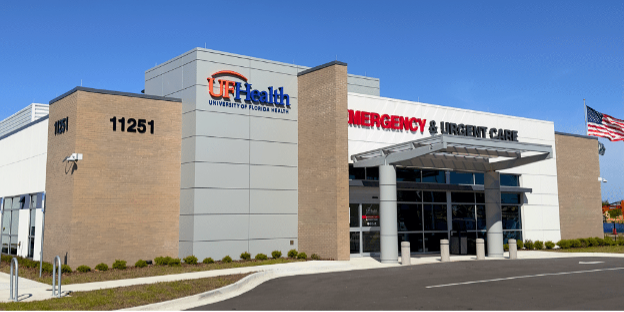Dislocated Shoulder: Symptoms, Complications and Treatments
- Category: General
- Posted On:

If you rated injuries on a scale of one to 10 based on pain level, a dislocated shoulder would receive a 10. Fortunately, you can eliminate the pain and start recovering by getting immediate treatment at UF Health Emergency & Urgent Care Centers.
First, learn more about the symptoms and diagnosis process. Then, find out what to expect when undergoing shoulder dislocation treatment.
Dislocated Shoulder Symptoms and Diagnosis
Shoulders often make a popping noise when the bone dislocates from the joint, but you can have a dislocation without hearing a pop. You’ll experience intense pain as soon as your shoulder pops out of the socket, and it’ll be hard to use your arm. When you try, the pain will intensify, making movement even more challenging.
Dislocated shoulders usually cause significant bruising and swelling, and the shoulder may look deformed because the bone is out of place. If you damage the nerves, you’ll also experience numbness or tingling in your shoulder, and possibly down your arm into your fingers.
Because of the extent of the symptoms, doctors can tell if your shoulder is dislocated with a physical examination. Even so, imaging tests are part of the diagnosis process. With MRIs, X-rays, and other tests, your doctor can tell how far the bone traveled out of the socket, its direction, and if it caused bone fractures, sprains or other injuries.

Injuries that Can Occur When Dislocating a Shoulder
Associated injuries often occur when people dislocate their shoulders. These injuries can happen from the trauma that caused the dislocation or the bone moving out of the joint and damaging its surroundings.
The common complications include:
- Blood vessel damage
- Bone fractures
- Nerve damage
- Rotator cuff injuries
- Soft tissue sprains and strains
Your doctor will examine you and order diagnostic tests for associated injuries. Treating these injuries and the dislocated shoulder will allow you to heal faster and avoid serious complications.
ER and Urgent Care Treatment for a Dislocated Shoulder
Shoulder dislocations are incredibly painful, so you won’t want to wait for a scheduled appointment for treatment. Instead, go directly to an emergency room or urgent care for treatment, keeping your arm as immobile as possible while on the way.
Putting your shoulder back in place is the first step in shoulder dislocation treatment. After giving you medication for pain, your doctor will manually guide the shoulder bone back into the joint. You’ll feel immediate relief once the bone is back in place, and you can begin the next stage of treatment.
Your shoulder joint needs time to heal and stabilize, so your doctor will put your arm or shoulder in a sling or splint. They will also provide exercises you must do while your shoulder heals. If you don’t do the exercises, you’ll have difficulty regaining strength and range of motion once you’re out of the sling or splint.
At-home exercise will help you recover, but you’ll also need physical therapy once you’re cleared to do so. The exercises at physical therapy will help you build strength, increase your range of motion and improve the overall stability of the joint and muscles. In turn, you’ll be less likely to dislocate your shoulder again.
Surgical Shoulder Dislocation Treatment
If you have extensive soft tissue damage, fractures or joint instability, your doctor might recommend surgery. Without surgery, you’ll be more likely to dislocate your shoulder over and over, making recovery a challenge.
This is usually an outpatient procedure, so you’ll only be at the hospital briefly. Then, you’ll go through the same protocol used for nonsurgical treatment. That means you’ll immobilize your shoulder, exercise at home and then move on to physical therapy.

At UF Health Emergency & Urgent Care Centers, our primary goal is to provide the residents of Northeast Florida and Southeast Georgia with exceptional service and the proper billing for the care they need. Our combined emergency room and urgent care is fully equipped to handle everything from allergies to fractures to chest pain, with on-site labs, CT, ultrasound and X-ray, all under one roof. The ER and urgent care centers are open 24 hours a day, 7 days a week. No appointment is necessary — just walk in!
Find the UF Health Emergency & Urgent Care Center in Jacksonville nearest you at https://euc.ufhealthjax.org/locations.
